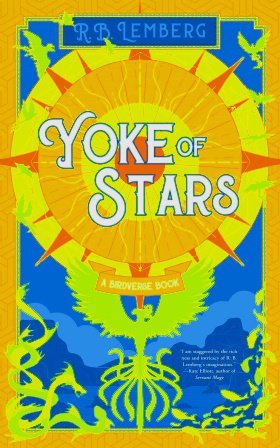“I do not see it this way,” she begins. Then says, “I am sorry. Perhaps your story is very different from mine.”
I tell Ulín, “I was so young when my story happened to me.”
“I was nineteen when most of mine happened,” she tells me.
“A few years younger than I was, then. I think.” Her words frustrated me, but the lilt of her voice is familiar and soothing. As if I am with a younger Old Song, whose voice does not hurt yet and only offers me comfort.
“I can tell you more of my story,” I offer. “If you wish to hear it.”
“I do.”

Of language and lovers
One morning, when mist shrouded the rocks of Stone Isle and my garment of moss grew cold with moisture, I tugged on my bond with Old Song and flickered to their side.
Song Isle was large—from the sun’s rising, there was no seeing the end of land. People of the Song storyline were prosperous. Everyone living wanted a story, to learn how to live, to be soothed, and to hear again and again that there was no need to fear death because when our bodies pass, we don’t go any farther than the ancestors’ Shoal in the sea. When others visited with people of Song, they brought gifts of fish, moss-woven garments, and colorful rocks to enjoy with the body while it lasts. The Song people were prosperous on their isle, but still Old Song stood alone.
My people say that it is dangerous to wander. That word, danger, in our language, is tah. Re-tah, toward-danger, means curiosity. En-tah, inwards-danger, means yearning. Ghe-tah, all-surrounding-danger, means to be alone. All of these words described both Old Song and me.
“I see a red light,” I told Old Song. “I close my eyes and drift to sleep, and I hear a song.”
“To journey away from the Shoal is dangerous,” they said. “You should anchor me here, with your powerful deepnames. Not wander.”
“Why do you need to be anchored?” I asked. “And why, of all Stones, must I be the stone to hold you?”
Old Song was unhappy with me. As a Stone, I was not supposed to be curious, just strong; but I was both curious and persistent. It took many tries until Old Song shared their secret with me. Their secret was that they committed a crime.
Old Song had a friend from the Boater storyline, a friend who was bonded to them through their two-syllable deepname. In a perfect world, the Boater storyline would not exist. All bonded people would flicker from one soul to another, traveling without moving between each other without the need for boats. In a perfect world, fish would be plentiful, close to shore. But we fell into this world by necessity, the Star of the Shoal already diminished. Our people are small in numbers and live in an unhospitable sea where the shoals of the fish have been dwindling, and so our way of travel alone is not enough. The Boater people build boats out of pieces of floating wood bound with moss, and these boats carry bodies to fishing grounds, and then carry fish to the isles. These boats also carry floating pieces of wood to make new boats. Sometimes, the boats carry siltway people to isles where they do not have bonds.
Being a Boater is paying too much attention to bodies, and so being in this storyline is dangerous, requiring the constant watchful supervision of Song.
But it was Old Song, in this case, who strayed.
I remember the isles now with different eyes, the eyes of a person trained to notice detail of the world of the body. I remember mist hanging over the stones. The air, full of the beating of gulls’ wings. Waves reflecting each other as the sun tumbled lower into the sea. The sound of the fish leaping from the wave. Nothing much changes there, and no change is desired by the Bonded Shoal. But with each year, the fish diminished, requiring the Fish and Boater storylines to stray further and further south.
And there, far to the south, was a coastline. A deep, endless forest of blue-green looming over the waves. Pieces of broken wood came from there, down and out into the sea. In that land, dreamway and nameway people lived together among the towering giants of living wood. These people, too, fished the sea, emptying it even more of sustenance for the living siltway of the Shoal.
Don’t venture near those people not ours, instructed the Star of the Shoal through the voices of the Song storyline. They must not know we exist. That way is danger. Do not yearn for danger.
But when the curious elder of Song heard this instruction, instead of teaching others not to stray, she herself began to yearn, and so moved us all toward danger.
“She?” Ulín perks up. “You used the language of they for Old Song before.”
I tilt my head, impatient. Of all the things, Ulín has latched to this. I grumble. “Yes, she, for this language Old Song found for herself in the forest. But first, she asked her Boater bonded to sail south, not to find floating wood or bring back fish, but to witness how your people live.”
“I understand her, I think.” Ulín chews her lips.
“Of course you do. When you leapt away from your people and toward your serpent prince, you were curious. You wanted to learn his language, you said.”
Sunlight is bright in the doorless opening of my room, and it’s harder to see Ulín’s face now, but I think she blushes. “He taught me more than that.”
“Of course he did.” I twitch, half-amused, half-frustrated. “Tell me.”

























